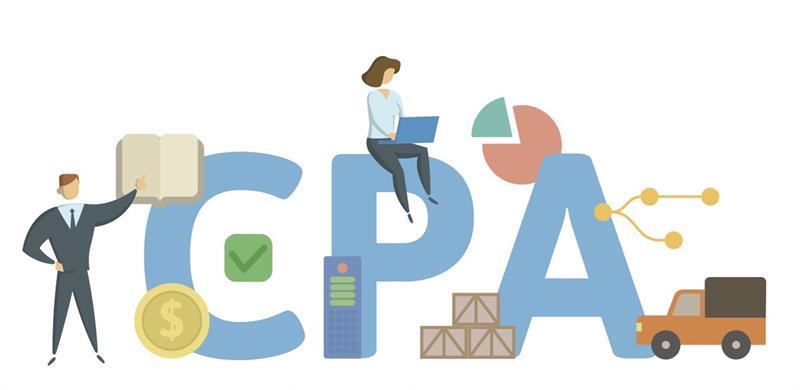
The Value of CPA (Certified Public Accountant) certification remains high due to the critical role that accounting professionals play in making financial decisions and compliance requirements. The CPA designation is globally recognized and opens doors to professional growth and higher pay in many industries.
Earning the CPA certification necessitates passing a rigorous exam, which can be intimidating for many candidates. Enrolling in a comprehensive CPA course can improve one’s chances of successfully passing the exam on their first attempt, opening up ways for a rewarding and exciting career in accounting.
The CPA exam is challenging to pass on the first attempt. Many aspirants become disappointed and perplexed as a consequence of their failed attempts. This article aims to bring insight into the possible reasons why some CPA exam candidates fail, as well as to offer guidance and assistance to the aspirants.
6 Most Common Obstacles to Pass the CPA Exam
- Not Creating a Realistic Study Schedule
One of the most common mistakes CPA aspirants make is failing to create an effective study schedule that allows them to manage the hours available during their testing window.
Most importantly, the study plan must be compatible with the aspirants’ work-life situation. Before planning their study schedule, aspirants should consider any important upcoming personal or professional obligations. Aspirants understand their situation better than anyone else, so they should ensure that their CPA Exam studies complement their personal and professional lives.
If aspirants want to see results, they must be dedicated and persistent. Aspirants will achieve far better results if they study for an hour or so every night. Set aside time for only studying and do nothing else during that time.
- Procrastination
Aspirants have 18 months to sit for the four sections of the CPA exam hence procrastinating and neglecting the exam preparation are setting themselves up for disappointment.
CPA Exam dates are available all year but don’t use this as an excuse to put off scheduling the exam. Aspirants can only start planning their studies if they have an official exam date on their calendars.
It makes no difference if the aspirants study for four hours a night if they doze off and tune out whenever they open a book or watch a lecture.
Make an effort to pay attention and make the most of your study time. By doing so, the aspirants will improve their memory of the material and cut their overall study time in half. A consistent, structured schedule will also be beneficial. Aspirants can train their minds to tune out everything and focus solely on exam preparation.
- Not Taking the Practice Test
The only way to avoid uncertainties on exam day is to understand the format and functionality of the test ahead of time.
Each part of the CPA Exam is four hours long, which may become exhausting if the aspirants have never taken a test that long before. The best way to prepare for a 4-hour exam is to sit for practice tests of the same duration from time to time. Taking the practice tests will improve the efficiency of the aspirants and allow them to become acquainted with the exam’s structure.
- Underestimating the Required Study Time
CPA candidates should focus more on understanding a concept rather than just recognizing it on the surface. The AICPA suggests that CPA aspirants study an estimated 300-400 hours for the CPA exam, which means approximately 80-100 hours of studying per exam section. However, many candidates say they need far more study hours than the AICPA advises.
Candidates may also discover that some concepts require more study time than others. Joining a holistic CPA course offered by a reputable institution can help aspirants create an efficient study schedule and prioritize topics that need more preparation time.
- No Breaks
This point may look counterproductive, but it is quite the opposite. Aspirants cannot study around the clock. More importantly, they are incapable of concentrating 24 hours a day. The quantity of study hours is less important than the hours of quality study.
Taking regular breaks is essential for maintaining a productive mindset. Watch TV, socialize with friends, and explore social networking sites, but don’t become addicted. Take regular breaks to ensure that studying is focused and concise. Do not cut back on study time, but maintain a well-balanced study and private life to ace the exam.
- Internal Barriers
Finally, some CPA candidates discover that their internal emotions can sabotage their success. For aspirants acquiring a CPA license can be considered essential to achieving career goals, so aspirants often get overwhelmed by the exam.
Intimidation, on the other hand, can impair the ability to focus and think clearly, preventing aspirants from reaching their full potential. While it may be easier said than done, don’t let fear or intimidation derail all the hard work and preparation.
Wrap Up
In conclusion, joining an extensive CPA course and acquiring the credential is a wise investment for career advancement. It unlocks new possibilities in the accountancy profession, such as better incomes, job stability, and the possibility of progress.
However, earning the credentials is challenging. Aspirants must be fully prepared to clear the CPA exam. Aspiring accountants can improve their chances of passing the CPA exam and achieving their professional goals by prioritizing their studies and applying for a quality CPA course.
So, don’t let the difficulty of the CPA exam deter you from pursuing your dreams. Instead, invest in your future by preparing well and taking the necessary steps to achieve your objectives.


